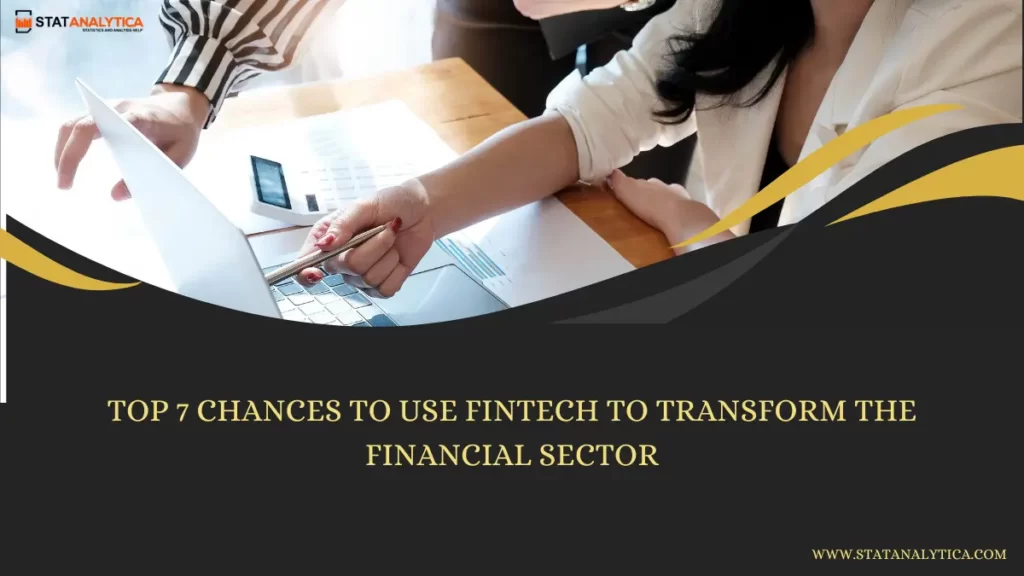Every day, you engage with fintech in various ways. For instance, you might use your iPhone to conveniently pay for a cup of coffee, or you might handle complex financial information while working. Every part of our lives that uses fintech to transform the financial sector has lately seen significant change as a result of technology’s recent spectacular expansion, especially such a key one as money.
The fintech market is still quite young. Lending and payments are among the top industry trends. There are still more chances to seize. Here is the whole list of prospects in fintech that may benefit both existing companies and company owners.
Top 7 Tech-Enabled Opportunities for Fintech to Transform the Financial Sector
Table of Contents
There are many chances to revolutionize the financial sector by realizing the full potential develop payment gateway software (financial technology). The top seven opportunities are as follows:
Mobile Wallets and Electronic Payments
Fintech enables us to use secure and convenient digital payment methods, reducing our reliance on traditional cash transactions. Users may simply make purchases, transfer money, and manage their accounts using their cell phones, thanks to mobile wallets and payment applications.
Bitcoin and Other Cryptocurrencies
Cryptocurrencies such as Bitcoin and Ethereum are built on blockchain technology, which has the power to revolutionize the financial services industry. It makes smart contracts, peer-to-peer transactions, and the need for middlemen in many financial operations unnecessary.
Platforms for Peer-to-Peer (P2P) Lending Online
Online and peer-to-peer lending are made possible by fintech platforms, which link borrowers and lenders. This expands the availability of effective and convenient loan choices, particularly for people and small enterprises that have limited access to conventional banking services.
Wealth Management and Robo-Advisors
Algorithms are used by robo-advisors powered by fintech to provide automated and individualized investing advice. These platforms democratize investing options for a wider variety of individuals and provide affordable wealth management solutions.
Solutions for Compliance and Regulation
Financial institutions may easily comply with constantly-changing rules thanks to regulatory technology (RegTech) solutions provided by fintech breakthroughs. These innovations improve risk management procedures while streamlining compliance procedures and lowering expenses.
Analytics and Artificial Intelligence (AI)
Financial institutions can make data-driven choices, identify fraudulent activity, and learn important details about client behavior and preferences thanks to AI-powered data analytics. This improves consumer experiences and makes it possible for financial services to be more personalized.
Web APIs and Open Banking
Customers may safely exchange their financial information with other financial service providers thanks to open banking efforts. APIs are really helpful because they make it easy for different financial systems to work together and provide modern and efficient financial services and solutions.
Fintech Advantages
- Cost reduction. In comparison to conventional financial institutions, fintech solutions often have reduced operating expenses.
- Enhancing the User experience Delivering smooth and user-friendly experiences is the goal of fintech.
- Efficiency and Quickness. Fintech accelerates financial transactions by streamlining procedures, including loan approval, account opening, and payment processing.
- Personalization. To comprehend client preferences and behavior, fintech makes use of data analytics and AI.
- Disruptive innovation. Companies in the fintech sector are leading innovators, presenting innovative technology and upending conventional financial structures.
- Security and Preventing Fraud. To safeguard user information and stop fraud, fintech businesses invest in advanced security procedures and technology.
- Assistance to Small Businesses. Fintech offers a variety of personalized solutions for small and medium-sized businesses, also known as SMEs.
- Systems that are Open and decentralized Blockchain-based technologies have the ability to make financial transactions more transparent, which in turn reduces the risk of fraud.
Enhancing Customer Engagement through Personalized Financial Technology
If you want to increase customer engagement, personalized financial technology is a great way to do so. This type of technology allows you to customize content and offers based on individual needs and preferences. As such, it can be used in a variety of ways:
- To create targeted marketing campaigns that speak directly to customers’ wants and needs
- As part of an overall strategy for strengthening customer loyalty through increased communication with the brand
- In conjunction with other forms of data collection (such as surveys), you have access not only to what people say but also to how they behave
Blockchain Technology: Revolutionizing Security and Transparency in Finance
Blockchain technology is a distributed ledger that maintains a continuously growing list of records. A blockchain can be shared among all participants in the network and has no central administrator, meaning it’s not controlled by any single entity. This makes it extremely difficult for any party to create false transactions or modify existing ones.
The blockchain is an immutable record of peer-to-peer transactions, which means each transaction must be verified by at least 51% of all nodes before being added to the chain (hence the “51% attack”). The fact that every node keeps an identical copy of the ledger helps eliminate fraud and double spending issues because no one party can control what gets recorded on their computer versus what gets recorded everywhere else in real-time.
In addition to security benefits, many companies are adopting blockchain technology because they believe it will increase transparency throughout their supply chains while also reducing costs associated with manual audits or regulatory compliance checks.
Conclusion
Worldwide investment in fintech surged by 106% in 2016 to reach $13.8 billion. Opportunities in fintech still have a great deal of promise with greater regulatory flexibility, cutting-edge technology, and creative company models. The fintech sector will continue to grow in 2016 and the years to follow, despite the efforts of both major financial institutions and new startups to capitalize on the opportunity and claim a piece of the action.
Also Read: Top 10 Economics Books For Beginners To Boost Your Skills


